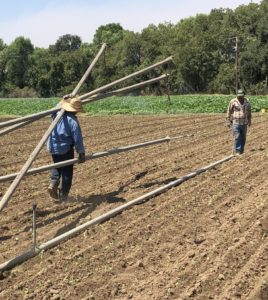
Excerpts from graduation address to the 7th California Farm Academy class on the steps of the state Capitol, Autumn Equinox 2018.
I want to talk a little bit about why I feel blessed to be a farmer. I have always loved and still love being outside, nurturing things as they grow. Taking care of crops is a form of connection with things that are real and honest — the challenge of pests, the effort of weeds, the anticipation of seeds. It is a true blessing to have work that includes a connection to Nature.
Another way that I love farming and can recommend it, is that I enjoy the Full Belly Farm community. Both the interns and the year-round crew have taught me a lot over the years, including a lot of the Spanish that I know. Speaking Spanish made my visits to Mexico more meaningful, not to mention the fact that Spanish is pretty useful for living in California, not just for visiting Mexico! Being a farmer in California is a bicultural experience, with many farms employing a majority of Spanish-speakers and operating in Spanish much of the time.
Some of these reasons why I recommend farming to you seem fairly simple. But there is also a bigger picture: In addition, I was drawn to agriculture because with agricultural lands encompassing over 40% of California, agriculture has a lot to offer towards solving some of our biggest natural resource and environmental problems and exploring that has been a very important part of my life at Full Belly.
Good farming practices can, for example, offer a lot of insight into farming without the use of water soluble nitrogen fertilizers that are causing very serious nitrate contamination of drinking water in the Central Valley.
Good farmers can show that it is possible to be highly productive without using chemical pesticides that endanger farm labor, air quality and food safety. And we can mitigate climate change in many ways, for example by sequestering and locking carbon into the soil.
The organic farming community has a lot of on-the-ground credibility as far as these water and climate issues are concerned. I’ve played a little bit of a double agent as a farmer — with one foot in farming and the other in the activist world, attempting to advocate for policies that will work on the ground to achieve positive environmental outcomes without putting farmers all out of business. I am confident that these issues will continue in some form, to shape agriculture, and I invite all of you to think about your role in shaping resource issue solutions as you build your food and farming future.
I’ve been farming at Full Belly since 1989 and in those 30 years, there has been a lot of change: The amount of agricultural land in California has dropped steadily by more than 50,000 acres a year; the number of farms in the state has dropped 8% from 83,000 to under 77,000.
Another significant change has been the growth in organic farming over the last 30 years. California has more organic farms than any other state. When we started farming at Full Belly, there wasn’t a federally recognized definition of organic – that happened in 1990 and it wasn’t actually implemented until 2002. There weren’t a lot of natural food stores then, and the market for organic products was small.
Another change has been the huge increase in the regulatory burden that farmers face around things like food safety, pesticides and water. While many of the regulations are written with good intent, they have not always worked as intended, and farmers have consistently been the collateral damage — the ones to pay the price. It is fitting that your class graduation is at the California Capitol because rules and regulations that are created here will have a big impact on your farming lives and you may find yourself called to visit here more often than you imagined.
Mentioning the changes that have taken place in California agriculture in the last 30 years is a way of pointing out that the same will be true for all of you. If you go into farming now, I invite you to cultivate a constitution in yourself that is comfortable with change and uncertainty! It is clear that more change is on the way. Groundwater quality and quantity is in decline; we are facing reduced snow pack in the Sierra over time; because of climate change, there are crops that can no longer be grown in the state and seasons that don’t support the crops that they used to; research and extension infrastructure receive less and less funding in our rapidly urbanizing state; the farm labor situation is in flux; and rural communities often lack very basic services. In addition, a lot of California farmland is expected to transition hands in the next 20 years, and we need farmers like all of you to step up and keep that land in agriculture, rather than watching it turn into strip malls and suburbs.
As I described, I love being a farmer for a mix of simple and big-picture reasons. There is a great feeling of accomplishment at the end of a day to see a cooler full of just-picked produce that will be in someone’s kitchen less than 24-hours from when it was picked. And there is also a feeling of pride in knowing that your farm and your example will play an incremental role in changing the world.
As I said, changes are coming, and California agriculture is especially vulnerable. For creative, innovative and educated people like all of you, these challenges can be turned into opportunities. We will need to call on all of our creativity, generosity and understanding to find our way through to a place where California agriculture remains as vibrant and abundant in several decades, as it is today. We will also need to call on our practical natures and common sense to make sure that the solutions will actually work on the ground.
The challenges will come from multiple directions and raise complex questions that will affect your farm, your community and the natural environment. By completing the program at the California Farm Academy, you have all taken the first steps. Now you must believe in yourselves and commit to your farming future. Congratulations to the Farm Academy and Congratulations to the 7th Graduating Class!
—Judith Redmond

Our irrigation crew at work — 4 pipes at a time!
